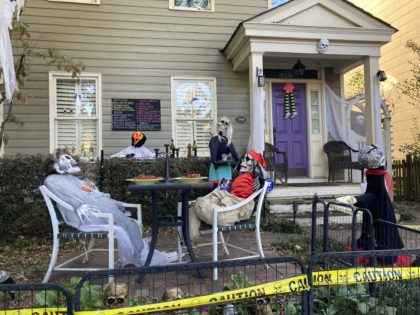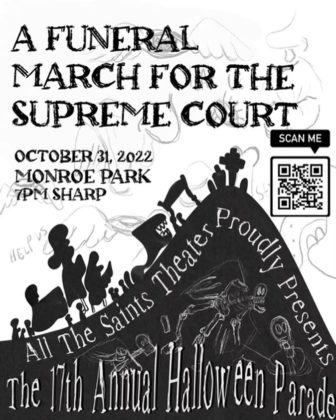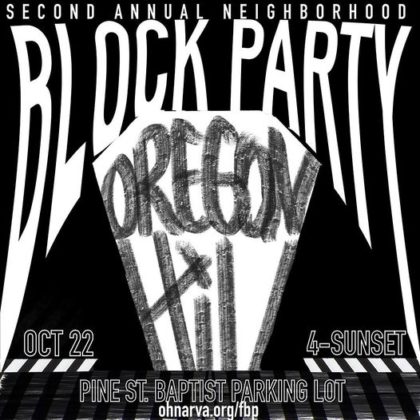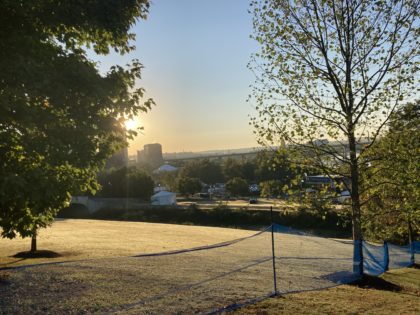

OHNA Meeting Tomorrow Night
From email announcement:
Good evening OHNA members,
I look forward to seeing everyone Tuesday at 7pm for our monthly OHNA meeting. This meeting will be Zoom only.
The Zoom link is provided below. This will allow for full remote participation.
I have attached to this email
1. the agenda for the 25 October meeting (also pasted in below),
2. the minutes for the September2022 meeting, and
3. the 2022 meeting schedule.Thank you to everyone who donated raffle or silent auction items to our second annual fall festival this past weekend. An email will follow with thanks to all donors to this event. Thank you also to everyone who attended — it was a wonderful time.
We look forward to seeing everyone Tuesday evening.
Thanks,
BryanMonthly Meeting Agenda
Tuesday 25 October 2022
7:00PM
This meeting will be by Zoom only.Topic: OHNA Monthly Meeting – October
Time: Oct 25, 2022 07:00 PM Eastern Time (US and Canada)(Contact ohnarva@gmail.com for Zoom link and info)
Welcome
• Treasurer’s Report
Community Updates:
1. Lt. Brian Robinson, City of Richmond Police Section Lt, 4th Precinct
2. Officer Luke Schrader, Police Liaison, VCU
3. Ms. Verenda Cobbs, VCU
4. Ms. Stephanie Lynch, 5th District Councilperson
5. Ms. Colette McEachin, Richmond Commonwealth’s AttorneyUpdates:
1. Update on the fall festival, Saturday 22 October 2022
Continued Business
2. Proposed Amendments to the Richmond 300 Land Use Plan / Neighborhood Coalition Update
• This item passed unanimously by City Council on 27 June 2022
• The Planning Commission hearing on 18 July 2022 was informational only; no vote taken.
• Planning Commission voted on this issue at the 15 August 2022 meeting (1:30pm).
o Despite the fact that we had 47 letters in support, and none in opposition, and had several speakers in support, and none in opposition, the Planning Commission voted unanimously against our amendment.
o Next steps3. Amphitheater planned for Tredegar Green.
· It is slated to seat 5,000 people and accommodate and additional 5,000 standing, as per our meeting with the developer’s representative. No additional parking is planned.
· When the previous amphitheater plan was proposed, the neighborhood raised questions about hours of operation, noise levels, and parking, none of which were ever answered.
o Applicant has not yet scheduled a meeting with OHNA4. An SUP application has been filed with the City of Richmond for the demolition of 708 China Street, and its replacement with a building.
· The Zoning Committee met with the applicant, and asked them to reconsider demolition and incorporate the historic building into their new construction
· The applicant has not yet come back to the neighborhood with a revision5. An SUP application has been filed with the City of Richmond for the construction of a two-family of 823 China Street, a vacant lot
· The Zoning Committee met with the applicant on 24 October 2022
· No recommendation yet. Still under discussion.6. An SUP application has been filed with the City of Richmond for the sponsorship signage to be placed around the field owned by St. Andrew’s School.
· The Zoning Committee met with the applicant. No recommendation.7. Traffic issues along Idlewood at Cherry and Pine Streets
· There have been a number of recent accidents at these two locations.
· These two intersections suffer from poor visibility and the high speed of cars exiting 195 east onto Idlewood.New Business
8. OHNA officer elections to be held at the 15 November meeting (moved up one week to avoid Thanksgiving)
Bryan Clark Green, President
David Cary, Co-Vice-President
Jennifer Hancock, Co-Vice-President
Chris Hughes, Co-Vice-President
Harrison Moenich, Secretary
John Bolecek, Treasurer
17th Annual Halloween Parade

Trash/Recycling Tomorrow
This Wednesday is a “Red Wednesday”, which means trash and recycling pickup.
Please go over what can be recycled. Ideally, rolling recycling containers are stored and deployed in the back alleys along with trash cans. Please make sure you pick up containers after pickup tomorrow night.
If it seems like pickup did not happen, use this online form:
https://cvwma.com/programs/residential-recycling/recycling-service-request-form/
If you have not done so already, don’t forget to sign up for your Recycling Perks.
In order to take your recycling to the next level, read this: 10 ways to improve your recycling.
Local recycling officials are reminding folks to pay attention. From the article:
“Recycling is not trash. Some people use those terms interchangeably, but for us, recycling is definitely not trash. For us, recycling has a value,” said Julie Buchanan, CVWMA Public Relations Coordinator.
Recycling officials say they already have to trash between 10% and 15% of what comes in, so they want you to double-check what you’re putting in the can.
Crews say they’re finding plastic bags, Styrofoam, cords and food waste, which are not recyclable. So now they’re putting “OOPS!” stickers on bins and not collecting them. The sticker tells you the problem and what needs to be taken out.
At the same time, A group of 17 lawmakers recently signed a letter asking the U.S. EPA to adopt a standardized labeling system for recycling bins, saying a single label design could reduce confusion and prevent trash from ending up in the recycling stream.
In the letter, the lawmakers say there are too many different versions of informational labels on recycling bins around the country, and a standardized format would more clearly explain what’s acceptable to recycle in each region. The call to action is backed by Recycle Across America, which has made standardized recycling bin labels a longtime project.
Of course, citizens should remember that recycling, in its current form, to some extent, is a scam pushed by corporations. It’s up to us to demand better.
OHNA Halloween Block Party This Saturday

Message from the Oregon Hill Neighborhood Association:
The annual costume contest will take place at 5pm at the Block Party this Saturday! Make sure you come in costume for a chance to win some awesome prizes!

Also, 1115mobilekitchen and Intergalactictacos will be slinging the eats at the event…


Armed Robbery at 7-11 On Belvidere
From VCU Alert:
In compliance with the “Timely Warning” provisions of the federal ‘Jeanne Clery Disclosure of Campus Security Policy and Crime Statistics Act’,Virginia Commonwealth University is providing notice of a recently reportedCommercial Robberythat may pose a serious or continuing threat to campus safety. This notice is intended to aid in the prevention of similar crimes and to enable members of the university community to protect themselves.
Reported offense:On October 17, 2022, at 2:36 a.m., Richmond Police were notified of a commercial robbery that took place at 122 South Belvidere Street. This was a delayed report to VCU Police.
Brief description of how the crime took place:The victim stated that a male walked into the establishment and stated, “Give it all to me” and displayed a black handgun. The left with an undetermined amount of US currency. There were no injuries reported.
Suspect/s:white male, blue eyes, wearing a black or blue hood sweatshirt, gray shirt, gray sweatpants, and black ski-mask. He was last seen running south on Belvidere Street from the incident location.
Investigating agency:Richmond Police are leading the investigation. Police have increased patrols in the area.
To reach VCU Police directly, call (804) VCU-1234 / (804) 828-1234 or use the LiveSafe app. Calls and LiveSafe tips are monitored 24/7.
Litter Pickup Tomorrow Morning
Councilmember Stephanie Lynch’s 5th District office is hosting a litter cleanup with VCU’s National Society of Collegiate Scholars along Cumberland & Idlewood tomorrow from 10am-11:30am. They are meeting at the 7-11 at Cumberland and Belvidere.
Please join!

It’s Folk Festival Weekend!

Great music with great weather!
Details and schedule can be found here:
https://www.richmondfolkfestival.org
My advice: plan to stay a while, see international acts that do not normally come through the area, explore, don’t become obsessed with ‘headliners’, take a few minutes at some point to walk over to Belle Island or other river park areas and give your ears a break with some nature, bring a light jacket and hat for when the sun goes down and the temperature drops (warm today and tonight but cooler temperatures move in on Saturday).
Of course, for Oregon Hill residents, its also a time to be neighborly and tolerant while also trying to maintain normal life.
From Venture Richmond’s festival organizers:
Info:
Oct 7-9
Hours
Fri 6-10pm
Sat 12-930pm
Sun 12-6pmRPD will have 3-4 officers in vehicles circulating the neighborhood ticketing/towing illegal parkers.
PD Brooks Traffic will be setting out large signage around the neighborhood saying ““RESIDENTIAL PARKING ONLY, VIOLATORS WILL BE TOWED”If you happen to see a vehicle illegally parked, feel free to call the non-emergency hotline – the officers roaming will have a direct tie to that.
(804) 646-5100
Trash/Recycling Tomorrow
This Wednesday is a “Red Wednesday”, which means trash and recycling pickup.
Please go over what can be recycled. Ideally, rolling recycling containers are stored and deployed in the back alleys along with trash cans. Please make sure you pick up containers after pickup tomorrow night.
If it seems like pickup did not happen, use this online form:
https://cvwma.com/programs/residential-recycling/recycling-service-request-form/
If you have not done so already, don’t forget to sign up for your Recycling Perks.
In order to take your recycling to the next level, read this: 10 ways to improve your recycling.
In local recycling news, Chesterfield County is privatizing recycling and its residents will have to pay for curbside pickup.
(In better Chesterfield news, the county was recently recognized for its ‘green fleet’ policies. It’s also working with GRTC to create more transit access.
Here in the City, folks are watching a new pilot composting program. The Richmond Compost Initiative is currently funded through early Fall 2023. The initiative seeks to divert food waste from the landfill by providing options for composting at convenient, citywide drop-off locations and then cycle that organic waste into high quality compost for community use.
Halloween House Decorating Contest
Oregon Hill, with the fantastic Halloween Parade, old Victorian houses, and nearby Hollywood Cemetery, has become well known as a ‘Halloween holiday neighborhood’.
The Oregon Hill Neighborhood Association has embraced this. In the past, this website has done a jack ‘o lantern contest, and now OHNA conducts a Halloween house decorating contest.
www.ohnarva.org/fbp
Email ohnarva@gmail.com w/ subject line “Best Decorated House Entry”


